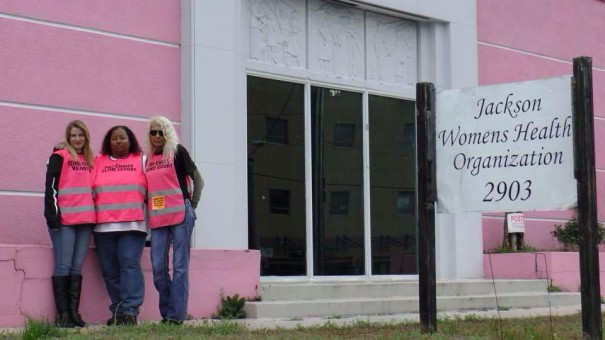Reposted with permission.
Abortion is the most restricted, antagonized medical procedure in the United States — despite also being the safest. Between 2010 and 2014, state legislators enacted 231 laws aimed to restrict access to abortion, the highest rate of increase of restrictions since the Roe v. Wade decision in 1973.
In conjunction with anti-choice legislative attacks, abortion providers, clinics, and patients face the threat of violence from anti-choice individuals each day. The anti-choice movement has taken the lives of eight people since 1993 and has perpetrated nearly 200,000 acts of violence and harassment against abortion providers since 1977. The fear abortion providers face while providing safe, legal healthcare is insurmountable and amplified by the troops of anti-abortion protesters, who invade the streets surrounding reproductive healthcare clinics across the country, claiming the title “sidewalk counselors.” However, “sidewalk bullies” is a more appropriate title for these people, who harass patients with gruesome, medically-inaccurate signs and literature, threats of regret, falsified medical complications, spiritual damnation, and impersonations of babies crying or begging for their potential lives.
In Mississippi — one of six states with only one abortion clinic remaining — the climate of hostility against reproductive rights runs high. At minimum, anti-choice protesters line the sidewalk outside of Jackson Women’s Health Organization (JWHO), recently in national news as a victim of anti-choice vandalization, each day that the clinic takes patients. In order to protect patients from the bullies and provide them with physical and emotional support, clinic escort volunteers stand on guard at JWHO when the doors are open. When I am able to return to my home state of Mississippi, I am one of those escorts.

However, at JWHO, fondly nicknamed the Pink House due to the bright pink color of the building, we don’t think the term “escort” accurately describes the work that we do for our clinic and her patients. In addition to escorting patients safely from their cars to the clinic doors, we actively defend the Pink House against the “anti’s” by enforcing property laws, playing music over their aggressive preaching, counter-protesting with our own signage, verbally correcting their countless sexist, racist, homophobic remarks, and masking their messages of shame with our own encouraging greetings and conversation. Due to our active-engagement philosophy of defense, we do not only consider ourselves clinic escorts; we are Pink House Defenders, a title that holds honor, responsibility, and, most importantly, power.
On my first day defending the Pink House, one of the anti’s asked me, “Why are you here?” At the time, it seemed to be a simple question that required a simple answer: Because women have the right to safely access abortion. However, as I have gained more experience in clinic defense, I’ve been analyzing my relationship to the reproductive justice movement more closely. My understanding of abortion access and lack thereof has become more complex, and it continues to evolve as I hear more abortion narratives and witness anti-abortion extremists committing violent acts against the agency of women*.
Now when I think about why I spend my breaks from Emory volunteering 10-12 hours a day in the cold rain or 100 degree humid air, I think about justice. I think about what people have the right to, what they deserve. Everyone has the right to safe, accessible healthcare. Everyone has the right to make decisions about their own body, situation, and future. Everyone has the right to be free from religious tyranny. Everyone has the right to perform their job without fear of violence. Everyone deserves to find support for their reproductive decisions. Conversely, anti-choice bullies deserve to know that shaming, harassing, and intimidating people is wrong. They deserve to know that we will not stand by while they encroach on our lives: our health, our dignity, and our voices. Clinic defense gives me the power to defend these rights and be a part of creating a more just world for Mississippians.
Just as my understanding of reproductive justice has transformed through clinic defense, my relationship to feminism has evolved. I have identified as a feminist since I first heard the word when I was 12 years old, so of course I have spent my feminist-lifespan expanding what feminism means to me. The meaning has exponentially grown since I began advocating for JWHO. In my everyday life, feminism is relational. I find power in sharing spaces with other women, and I seek to support others as I have learned to support the patients at the Pink House. I draw inspiration from the other Pink House Defenders, who have inspired me to be fearless and embrace self-empowerment. I am no longer hesitant to stand up for feminism and choice even when those I am challenging hold more social privilege than I do. Because of my experiences as an escort, I know my voice matters in the reproductive justice movement, and I have the power to transform a person’s experience by showing them that I am on their side no matter what reproductive decision they make. Each day I spend at the clinic is a feminist act as I escort patients across the frontlines of misogynist attacks.
NOTE: Although I use some gendered language in this article, I recognize and honor the fact that not all people who seek abortions are women. Abortion patients include people from a multitude of gender identities, including trans men and gender nonconforming people. I have chosen to include gendered language in this post because anti-abortion violence is rooted in hatred for women.

